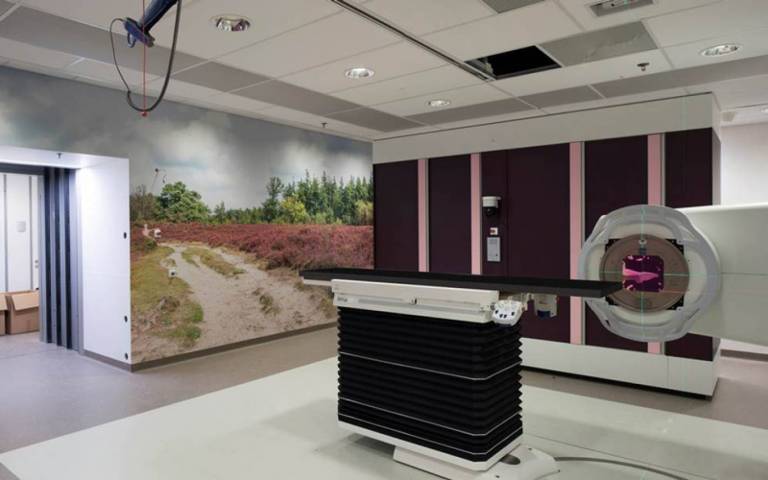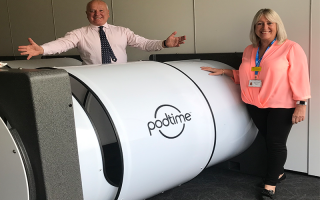This MSc is designed for healthcare and built environment professionals to learn about the challenges facing healthcare real estate provision and operation in the 21st century.

On this page
- Programme overview
- Industry links
- Key information
- Fees and funding
- Teaching and learning
- Careers and employability
- Alumni
Programme overview
Healthcare Facilities MSc provides an integrated and interdisciplinary programme related to healthcare facilities in the widest sense. You will have the opportunity to transform the wider healthcare community’s view of the role, design and operation of built forms that support health activities.
The programme will cover all aspects of the process of creating, renewing or managing healthcare facilities. We will guide you through your own personalised learning journey, tailored to your background and interests as much as possible.
This transformative Master's degree will enhance the quality of your decision-making around healthcare facilities. We will establish a common language, communication channels, interdisciplinary working patterns and understanding of healthcare policies, services, systems and cultural paradigms across the globe.
Your learning journey will be personalised and specific to your own interests. Each module will have a ‘live’ problem set in collaboration with external organisations that will enable you to learn within a real-world context.
Course structure
The programme is seminar based with an emphasis on case and problem based learning, supported through readings and class exercises in the taught modules. The assignments are mostly individual essays and potentially combined with group work and individual presentations. The dissertation is an independent piece of research supported by tutorials.
Typically each module is delivered through one-week intensive block teaching; supported by pre- and post-session readings and exercises online, through the university virtual learning environment. Each module provides 40 contact hours, supplemented by 110 hours student self-directed study.
For a Postgraduate Diploma (PG Dip), students undertake four 15-credit modules and a 60-credit dissertation or eight 15-credit modules. For a Postgraduate Certificate (PG Cert), students undertake four 15-credit modules.Three modules are particular to healthcare and one is more broadly real estate. For more information, please refer to the UCL Graduate Prospectus.
Modules
Four of the core modules will be shared with other Master's students at the Real Estate Institute. The other four have been specifically designed for the Healthcare Facilities programme.
Development and Capital Projects
This module explores the development process from a theoretical and practice-based perspective. It explores the key constructs that underpin real estate related development as a unique activity and capital projects as an enterprise within an international context. The module provides theoretical positions on the three major stakeholder groups – consumers, production and public – within an international context and the problem-specific case study reviewed within the module.
Real Estate Solutions and Systems
This module considers the physical characteristics of buildings, building systems, and the contribution and impact on: 1) The immediate: the occupiers and users of real estate and space users; 2) The local: those who border or are within the direct vicinity; 3) The global: the wider and more aggregate impacts and consequences. The module takes a life-cycle approach to considering the creation of a physical asset.
Modern Economics and Finance for Real Estate
This module sets out the modern principles of both economics and finance as they relate to the world of real estate. The established understanding of all three key words in this module: economics, finance and real estate are questioned and challenged. There is a growing body of heterodox economics that challenges the presumptions of the neoliberal mainstream economics that has dominated. The Global Financial Crisis of 2008 has not simply disturbed standard economic cycles, but appears to have disrupted the assumptions and logic that underpin much of the fundamentals of economics thinking and practice. This is highly relevant to the closely associated world of finance and this has transitioned into real estate.
Forms of Value for Real Estate
The aim is to first consider the different ways in which real estate generates or contributes ‘value’. This is an area that has been recognised for a very long time indeed, but principally from a financial / economic / accountancy perspective. Yet real estate has not yet developed a fixed and widely deployed approach to the measurement of other varying forms of value and the metrics to be used. During the course of this four-day module, you will seek to both propose and produce a framework for looking at and valuing real estate based on both the tangible and intangible elements of this asset.
Health Systems, Services and Technologies
This module provides a broad overview of healthcare systems, services and technologies and their facilities. It includes a wide-ranging introduction to the cultural, economic, and health status of a society as the context for its healthcare facilities. It explores concepts of health needs together with health policy, service delivery patterns, and the built environment response. In addition, the module also explores the needs of patients in physical health care settings. These issues provide opportunities to support the key elements to capital planning processes such as business case development, option appraisal and the interaction of the briefing and design process.
Health Services: Primary Care
This module explores Primary Care, one of the major components of a healthcare system. Primary care consists the spine of most national health systems such as the NHS and plays the role of gate keeper. The module then explores the growing, strategic role of primary care for the sustainability and the quality control of any system. It then examines the technological and planning changes that are resulting in the development of e-health, the integration of other health services in primary care, including services that so far have been provided in hospital sites.
Health Services: Hospitals and Complex Facilities
Hospitals comprise some of the most complex buildings in real estate and key components of healthcare systems. Their sophistication increases, following medical breakthroughs, the shift of healthcare services towards the community and advances in diagnostic and intervention technologies. The dynamics of models of care, placement in healthcare systems and relations to other hospitals add to the complexity of typologies, building organization and materiality. The module explores the evolution of hospitalization, its relation to systems and care models as well as indicative types of hospital care: from community and general hospitals to tertiary, mega-hospitals and the latest concept of medical cities.
Health Services: Long-term Care
Facilities for long-term care constitute one of the fastest growing sectors of healthcare real estate, undergoing organizational change, expansion and increased involvement of both private players/initiatives and interaction with social care. The module explores care provision (mental health, physical rehabilitation, interface of rehabilitation and housing, geriatrics, end of life care, substance abuse, correction facilities, social housing, assisted housing/living, care/nursing homes, senior-citizen housing, dementia friendly communities) with an emphasis in tangible and intangible values and appraisals.
Dissertation (Healthcare Facilities)
The MSc Dissertation is an original 10,000-word project based on research work undertaken by you. The topic is selected by you in agreement with your module leader. The topic can be selected from a wide range of problem areas related to the main programme and may be selected for its inherent interest and/or to assist career development. Collaboration with an external real estate development enterprise or other relevant party will be encouraged if appropriate to the topic.
Please note that the list of modules given here is indicative. This information is published a long time in advance of enrolment and module content and availability is subject to change. Students undertake modules to the value of 180 credits: 120 taught credits and 60 dissertation credits. Upon successful completion of 180 credits, you will be awarded an MSc in Healthcare Facilities. Upon successful completion of 120 credits, you will be awarded a PG Dip in Healthcare Facilities. Upon successful completion of 60 credits, you will be awarded a PG Cert in Healthcare Facilities. For more information, please refer to the UCL Graduate Prospectus.
Why study at The Bartlett School of Sustainable Construction?
We are:
- Located within The Bartlett, the UK’s largest multidisciplinary faculty of the built environment, in one of the world’s top universities.
- Based in London, close to world-leading architectural, engineering and creative practices, and the centre of real estate development, finance and investment activity.
- Focused on transforming the career prospects for students from over 80 countries as they become the most sought-after leaders, creators and managers of the future.
Industry links
The MSc is a unique programme in terms of both applicant appeal and professional relevance, covering many stages of decision-making, and stakeholder relevance for healthcare facilities.
Dr Upali Nanda – Senior Vice President and Director of Research, HKS Architects (USA):
“This course will help shape the future of healthcare design. It is much needed in a time when healthcare is changing rapidly, to equip our future practitioners with a foundation that is research-based, innovative and systemic in its approach.
Dr Daniel Davis – Consultant in Geriatric and General (Internal) Medicine, Department of Medicine for the Elderly, University College Hospital (UK):
“I would like to express my support and enthusiasm for the MSc in Healthcare Facilities. A clear understanding of patient experiences in relation to the built environment, in particular with respect to healthcare facilities, is a critical challenge. This programme will consolidate UCL’s international expertise in this area, with the ultimate goal of contributing to the future optimisation of patient clinical and care pathways.
Dr Wayne Ruga – Founder and President, The CARITAS Project (USA):
“I am absolutely delighted to learn of the creation of a Healthcare Facilities MSc course at UCL. There is a critical need for such a course, and I have every confidence that it will close the gap that presently exists in the field. This new course is well positioned to provide the training in effective decision-making for highly complex and diverse facilities, especially since the development of healthcare facilities is such a multidisciplinary endeavor.
Key Information
Duration
This MSc is designed to provide a variety of routes. We offer a full-time Healthcare Facilities Masters across one calendar year. Or you can take a part time or flexible/modular pathway, completing the course over two years, or up to five years for the flexible/modular. For students who want to have a flexible choice of certification, you can complete a PG Cert (four modules) or a PG Diploma (eight modules or four modules with the dissertation). This route excludes the dissertation. It enables students to select from a palette of modules to meet their own educational, personal and career development needs.
Healthcare Facilities MSc modules are taught in week-long blocks (each module requires one week attendance on campus), so can be aligned easily with employment demands.
Entry requirements
Read the full entry requirements for this programme on the UCL Graduate Prospectus.
Personal Statement
Could you please describe why you want to study the Healthcare Facilities MSc? How has your experience so far and values made you interested in healthcare environments? What do you consider to be your key strengths? How do you hope your studies will help your future individual and career development?
Fees and funding
Fees
Information about tuition fees for this programme is available on the UCL Graduate Prospectus.
Funding
There are a range of loans and other funding opportunities available to help prospective students with their studies.
For a comprehensive list of the funding opportunities available at UCL, including funding relevant to your nationality, please visit the Scholarships and Funding section of the UCL website.
Teaching and learning
The programme is seminar-based with an emphasis on case and problem-based learning. This is supported through readings and class exercises in the taught modules.
The block teaching approach will include group work and presentations for each module. The assignments are individual essays and potentially combined with group work. The dissertation is an independent piece of research that will be supported by tutorials.
- Key Staff
Dr Evangelia Chrysikou, Programme Director
As well as being a Lecturer at the Bartlett Real Estate Institute (BREI), Evangelia is a registered architect (ARB) and medical planner. She is among the few architects globally holding a PhD in healthcare architecture.
Contact
e.chrysikou@ucl.ac.ukDr Rodrigo Martinez-Mazza, Module: Forms of Value for Real Estate
Contact
r.martinez-mazza@ucl.ac.ukDr Judy Stephenson, Module: Development & Capital Projects
As well as teaching construction economics and finance, and economic history, Judy is a Fellow of the Higher Education Academy and Departmental Tutor and Director of Teaching & Learning at Bartlett CPM.
Contact
j.stephenson@ucl.ac.ukDr Shen Wei, Module: Real Estate Solutions and Systems
At UCL, Dr Wei is currently teaching two modules, i.e. Building Services 1 and 2 at Undergraduate level and one workshop (Soft skills - A key to your success) at Postgraduate level.
Contact
shen.wei@ucl.ac.ukProf. Stanimira Milcheva, Module: Modern Economics and Finance for Real Estate
Contact
s.milcheva@ucl.ac.ukTeaching and Learning Administrator
Suzanne Hogan
suzanne.hogan@ucl.ac.uk
Careers and employability
'The programme is expected to develop decision-making skills, research skills and analytical techniques. Participants will have possibilities for career development at all levels within the healthcare and the built environment sectors. The collaborative nature of the course provides students with practical skills that are highly sought after by employers from the real estate, engineering, architecture, healthcare architecture, medical planning, healthcare facilities management and construction. Students could also find employment opportunities at government and organisations, in departments such as the capital and facilities & estates of the NHS, public health and social care.
Graduates will have additional possibilities to carry out future research and consultancy in the field. In addition, the MSc can provide a foundation for MPhil/PhD research.
Alumni
UCL’s Alumni Community allows students from all levels of study to connect with volunteer alumni mentors. There is a dedicated Built Environment Network and international groups from Japan to the USA, so you can build new connections with alumni from over 190 countries worldwide. Whether you are seeking professional advice to perfect your CV or want to explore a particular career path, a global network of experienced UCL alumni is ready to support you.
health architecture construction design real estate project management infrastructure
 Close
Close


 Find our more about the Healthcare Facilities MSc through this programme webinar delivered by Dr. Evangelia Chrysikou.
Find our more about the Healthcare Facilities MSc through this programme webinar delivered by Dr. Evangelia Chrysikou. 

